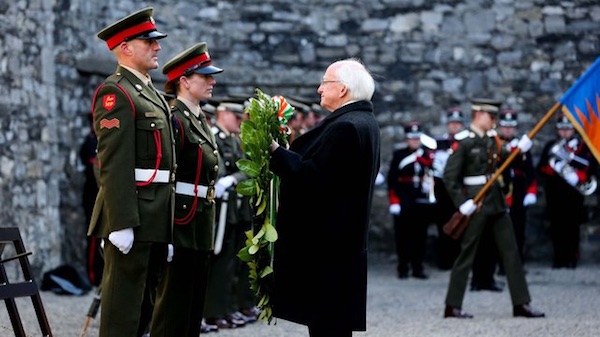
In a speech to mark the centenary of the 1916 Easter Rising, President Michael D Higgins has called for an end to the pro-British bias in the interpretation of events at the turn of the last century.
He said the “supremacist and militarist imperialism” of Britain over the period had not been reviewed with “the same fault-finding edge” as that applied to the Irish nationalist and republican traditions.
His comments mark another step forward for the 26 County state which has long wrestled with commemorating an independence struggle that succeeded in liberating only part of the island, but which is still echoed in the conflict in the North.
They mark a climax of a spectacular weekend of events, which has seen almost every tone and thread of Irish society commemorate the Rising, albeit in different ways.
Yesterday, a crowd estimated in the hundreds of thousand lined the streets of Dublin on Sunday to view a commemorative parade by almost 4,000 members of the armed forces and emergency services, complete with tanks and military aircraft.
An officer of the 26 County army read out the 1916 proclamation declaring “the right of the people of Ireland to the ownership of Ireland”.
In an effort to direct any upsurge in Irish nationalism, the Dublin government has sought to stress the “inclusivity” of the events, highlighting the numbers of civilians and British military who died.
However, plans to invite members of the British Royal Family were quietly abandoned earlier this year, while unionist politicians have all refused their invitations. The North’s First Minister, DUP leader Arlene Foster, refused to attend any events to mark what she described as “a very violent attack on the state”.
Britain’s Direct Ruler in the North, Theresa Villiers, welcomed Dublin’s efforts to ensure the commemorations were “inclusive and designed to promote reconciliation”. Sinn Fein leader Gerry Adams also backed “genuine efforts to outreach to the unionists”, although he also accused the Dublin government of ‘insulting’ the memory of the rebel leaders.
“The southern state is not the Republic proclaimed in 1916,” he said, as he attended an Easter Rising event in Belfast.
In Mr Higgins’s remarks at a talk entitled ‘Remembering 1916’ at Dublin’s Mansion House, home of Dail Eireann, the first independent all-Ireland parliament after the rebellion, the President called for a greater balance in Irish media and historical writings.
He said there “has been a great deal of critical reassessment of aspects of the Rising and, in particular, of the myths of redemptive violence that were at the heart, not just of Irish nationalism, but also of imperial nationalism.
“My view is that the latter has not, perhaps, been revisited with the same fault-finding edge as the former.
“Indeed, while the long shadow cast by what has been called ‘the Troubles’ in Northern Ireland has led to a scrutiny of the Irish Republican tradition of ‘physical violence’, a similar review of supremacist and militarist imperialism remains to be fully achieved.”
He pointed out that, in the context of the First World War, British Army recruitment campaigns had glorified the fact that Irish blood had ‘reddened the earth of every continent’. “But this is for another day,” he added.
He described the leaders of the 1916 rebellion who were executed by Britain as “advanced thinkers, selfless women and men, who took all the risks to ensure that the children of Ireland would, in the future, live in freedom and access their fair share of Ireland’s prosperity”.
Their vision had not been realised, he said, and Irish people have a duty to retrieve the idealism at the heart of the Easter Rising, and an even greater duty “to imagine and to forge a future illuminated by the unfulfilled promises of our past”.
“All of us are invited, then, in this year of 2016, to reach for the ideals and hopes that animated so many of the men and women of 1916 in their struggle for freedom, equality and social justice.”
After the Irish Republic was declared outside the GPO in the centre of the capital on Easter Monday 100 years ago, rebels took up positions at Boland’s Mill, the Jacob’s Factory on Bishop Street, City Hall, The Four Courts, The Royal College of Surgeons, Moore Street and the South Dublin Union on the site of the present-day St James’ Hospital.
As part of the official state commemorations today, wreaths were laid at seven locations around Dublin which were key to the revolt.
Sinn Fein also held a number of commemorations across the island this weekend, as did a several republican organisations. A full report on these will follow in our next issue.
![[Irish Republican News]](https://republican-news.org/graphics/title_gifs/rn.gif)
![[Irish Republican News]](https://republican-news.org/graphics/title_gifs/harp.gif)

